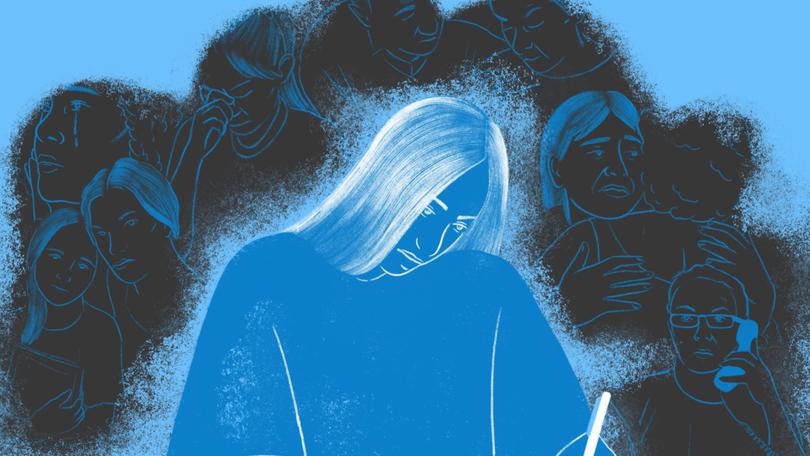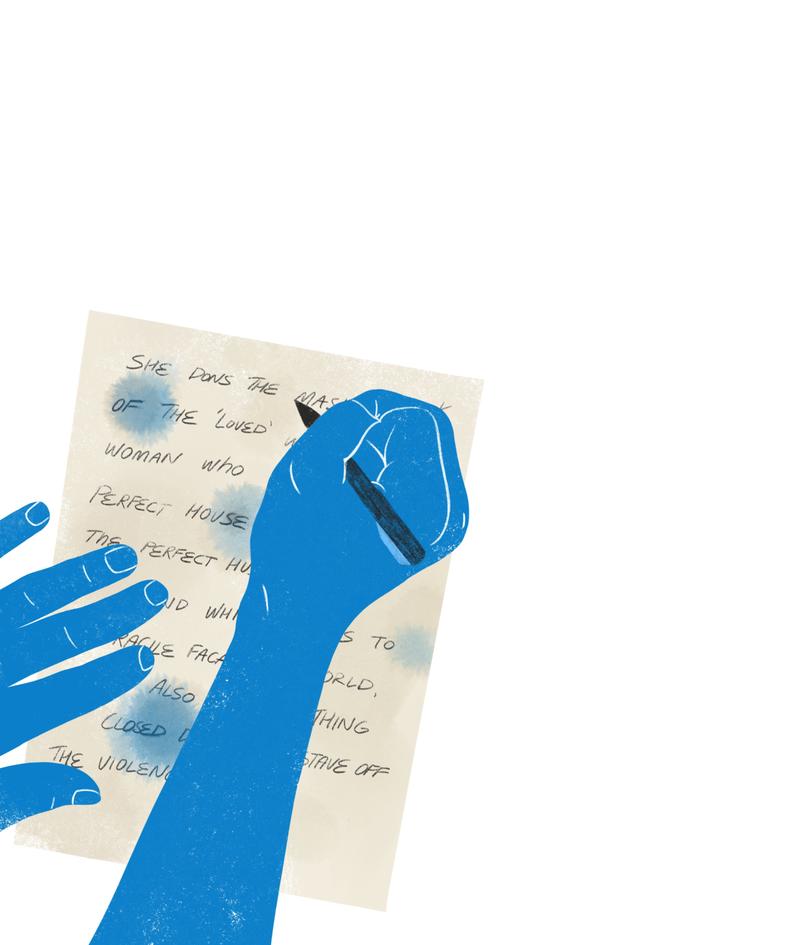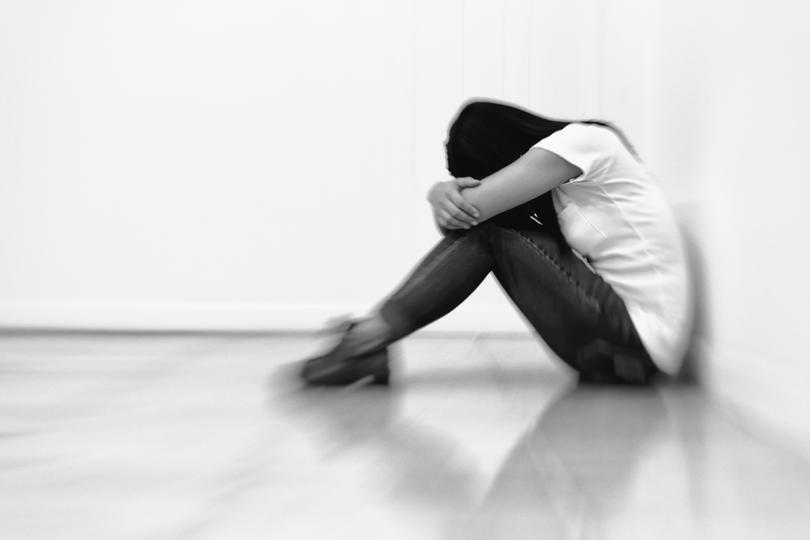The shadows that linger: A powerful first-person account from a survivor of family violence
In this powerful first-person piece, a survivor shares what she wants others to understand about living with the spectre of domestic violence and its aftermath - and how we can all help victims move forward.

Please know that this is not just my story, it is also the story of one in four women in our society who also live or have lived under the shadow of abuse and domestic violence.
When people talk about domestic violence, they use words like abuse, victim, perpetrator and lived experience.
From the perspective of someone who has survived domestic violence, I know what these words mean to me. I would ask you to consider what they mean to you. Society sanitises what is raw, brutal and vicious and perhaps there’s a reason for this. Perhaps it’s easier for us to hide behind these clinical words so we can go about our business.
Sign up to The Nightly's newsletters.
Get the first look at the digital newspaper, curated daily stories and breaking headlines delivered to your inbox.
By continuing you agree to our Terms and Privacy Policy.The sad fact is, that violence against women, domestic violence, is our business. It’s happening to our mothers, our sisters, our daughters, our women. So why do we allow this to continue? Why aren’t we doing something about this? If I may, let me de-sanitise these words for you. Let me paint you some pictures.
They call it abuse — it starts with him putting her down, calling her names and humiliating her. He makes light of the abuse by saying he was only joking and that she has no sense of humour. He says the abuse never happened, that she imagined it; or he blames her for his toxic behaviours, saying she caused it, and that it was her fault.
He begins to control what she does, who she sees and talks to, what she reads, what she wears and where she goes. He begins to isolate her from her family and friends. He treats her like a servant, makes all the decisions, defines her role in their relationship and acts like the king of the castle. He takes control of the finances, makes her ask for money and then makes her justify every cent she spends.

He uses coercion and threats to hurt her, so she lives in a constant state of fear. He smashes things, comes at her with clenched fists. He threatens to harm her family or kill their pets if she says anything to anyone. He punches her, beats her, kicks her and chokes her. He hurts her during sex, makes her do things she doesn’t want to do and rapes her. He violates her in every way possible and says he will kill her and the children if she leaves. He does whatever he wants to her, whenever he wants. This is what abuse really means.
They call her a victim — can you even begin to imagine what it must be like to wake each day with a feeling of dread, knowing the terrors the day will bring and yet, still have to get up, get dressed, look after the children, go to work and try to live a semblance of a normal life?
Can you imagine having your body, mind and heartbroken, and yet, still showing up and do whatever it takes to live and survive every moment of every day? This is the life of a woman living with violence. This is not the life of a victim; this is the life of a survivor.
They call him a perpetrator — is he a criminal, a low-life, someone you see on TV running from the law, someone completely separate from your world? The reality is that the perpetrator could be your brother, your father, your neighbour, your colleague or your friend.
To the world, a perpetrator appears normal, charming, one of the boys, a good mate. But believe me when I say he is two-faced. There is the one he shows to the world and a completely different one behind closed doors. When no one is watching, he is cruel and vicious, with little or no empathy or regard for the pain and terror he inflicts on her. He takes no responsibility for his behaviours or actions. Everything is always her fault. This is how a perpetrator behaves.
And what is “lived experience”? Lived experience is that stomach-churning feeling of constant dread and absolute powerlessness. It’s living on eggshells, not knowing in what form or when the next attack will be.
Lived experience is not knowing whether she will be ignored or insulted, talked to, or thrown across the room. Lived experience is not knowing as he comes towards her whether he will caress her or choke her, whether he will kiss her or try to kill her. This is a little of what lived experience looks like.
But the worst of it all is that she is totally alone because that is the way he has set her up.
When they first meet, he targets her, woos her, love-bombs her, showers her with attention and tells her she is the woman of his dreams. This grooming happens slowly over time, and he does it so well, that she believes him.
He presents to her family and friends as this wonderful loving, kind, generous man, and he charms them to his side, and they believe him. Then like the constant drip of a tap, the abuse in all its forms, starts and grows with each day. He has isolated her completely so she has no one to turn to. No one else has seen his dark side, so no one will believe her; she has nowhere to go. She is trapped.
And so, she dons her masks to make it through each day, because this is the only life she has, a life of pain and shame. She dons the mask of the “loved” woman, of the woman who has it all: the perfect home, the perfect life, the perfect husband with her the perfect wife.
And while she continues to maintain this fragile facade for the world, she is also doing everything behind closed doors to stave off the violence, knowing that nothing she does can stop it. She must be constantly on alert and hyper-vigilant to his mood swings. She must learn to anticipate and adjust her behaviours and responses, according to his behaviours, his moods, his attitudes and his beliefs. She struggles with anxiety, depression and imposter syndrome, worried that the world will discover what a failure and a fraud she is. This is her life. This is her lived experience.
You ask, why doesn’t she just leave? Every ounce of her strength is taken up just surviving, and after all this, if she does leave, she knows he will come after them and kill them. So in this physically, emotionally and psychologically battered state she must start from scratch, often with no money, no home and children who are totally dependent on her.
She has to learn how to budget, pay bills and be the breadwinner. She has to fill out forms, stand in queues, take a number, ask for hand-outs, just to survive. The fragility of her psyche is further tested by systems and attitudes that look down on her because she left; she broke up with the family and for that, she is judged.
She becomes a single mother, a second-class citizen, struggling to make ends meet. The freedom that she longed for terrifies her because she doesn’t know how to cope, she doesn’t have the tools or the support to help her. This new world that she has escaped to is yet another dangerous and scary place. And you ask why she goes back to her abuser.
But even if she does manage to persevere and set up a life for herself and her children, life is still a struggle — just a different kind of struggle.
She does her best to create a safe place; having lived in a world that has been extremely dangerous for her, being safe becomes her critical need. A place where she can drop the masks, where she doesn’t have to pretend to be OK, where she can be broken without making anyone else feel uncomfortable, a place of no judgement. But even in her safe place, the legacy of her “lived experience” follows her like a dark shadow — it never goes away.

Because as she learns to live with the abuse, she now has to learn to live with the effects of what the abuse has done to her body and her mind. She has to learn to live with her trauma, her PTSD and the flashbacks that can be triggered by the most innocuous situations. She has to learn to live with her insomnia, knowing that if she does sleep, the nightmares, the cold sweats and the night terrors will come.
She has to learn to live with the pain of broken bones that were never tended to, and the muscle memory of the physical abuse that never seems to fade. She has to learn to live with her emotional, mental and physical exhaustion. She has to learn to live with the heartbreak of watching her children deal with their own trauma, their anxieties, and their pain, knowing that in some way she is also responsible.
She keeps mostly to herself because even though she desperately wants real connections, her experiences have shown her that people are dangerous. Men are dangerous, for it’s the men in her life that caused her trauma, and it’s women who knew and chose to look the other way or did not believe her, or judged her.
She doesn’t allow anyone to get too close, for it’s safer for her to be alone. She learns and accepts that because of the shadows that linger, there will never be a happily ever after for her, and she is OK with that because, despite all the odds, she survived.
I would ask you then, if there is a woman in your life who has suffered at the hands of a man, is this the life you would want for her? Wouldn’t you want to show her a better world? Where could you start?
I would invite you to consider the following. She doesn’t need your pity or your judgement, because that is actually disrespectful to her. What she needs is for you to believe her.
She needs your empathy and acknowledgement of the courage and strength it took for her to get to this point.
She doesn’t need you to fix her, she needs you to see the beauty and the strength in her brokenness, and she needs you to support her and believe in her.
She doesn’t need you to tell her how she should live or how she should feel. She needs you to accept her as she is, stand by her and support the choices she makes. She is doing her best. Suspicion, mistrust and wariness are what kept her alive. Please don’t judge or condemn her for not trusting you, or for being wary, or suspicious of your kindness. This will take time. She needs you to understand this.
She also needs you to be her voice. Stand up for her and for women like her. Be the voice for our women who have been broken, who have literally been beaten into submission. Give our women the respect, dignity, support and compassion they deserve. Give our women the opportunity and the tools to be free and to feel safe again. Help our women to regain their self-worth and sense of belonging.
And more than that, consider what you can do to effect change in a world where our women have to live under these horrific conditions.
Consider this: violence cannot occur in a relationship where there is mutual respect and an equal power balance. So as a society, do we need to consider the power balance between our men and women? Do we need to consider why so many men treat women with such disrespect? By not making it our business, by not challenging these behaviours, and by our inaction, are we enabling our men and our boys to act like bullies who abuse those who are vulnerable? How have we been complicit in allowing this to happen?
Look within and see where there is an imbalance of power in your relationships. Consider where you might unwittingly have been a perpetrator. Reflect on your attitudes and behaviours towards women. Where have you been disrespectful? Where have you imposed your will or your beliefs on a woman? Where have you stood by and watched a woman being disrespected?
They say that all it takes for bad things to happen is for good people to do nothing. You are here — you need to be the good people who do something. Make it your business every single day to call out bad behaviour. If you see inappropriate behaviours towards women, don’t just stand by and do nothing. Say something. Do something. Say no to violence against women. Thank you for taking the time to read my reflections.
If you or someone you know needs help, contact 1800 RESPECT (1800 737 732), or Sexual Assault Counselling Australia on 1800 211 028, the WA Sexual Assault Resource Centre on 6458 1828 or 1800 199 888 or Lifeline on 13 11 14.
Originally published on The Nightly
